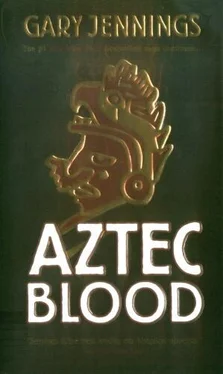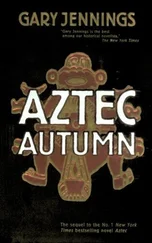Gary Jennings - Aztec Blood
Здесь есть возможность читать онлайн «Gary Jennings - Aztec Blood» весь текст электронной книги совершенно бесплатно (целиком полную версию без сокращений). В некоторых случаях можно слушать аудио, скачать через торрент в формате fb2 и присутствует краткое содержание. Жанр: Старинная литература, на английском языке. Описание произведения, (предисловие) а так же отзывы посетителей доступны на портале библиотеки ЛибКат.
- Название:Aztec Blood
- Автор:
- Жанр:
- Год:неизвестен
- ISBN:нет данных
- Рейтинг книги:4 / 5. Голосов: 1
-
Избранное:Добавить в избранное
- Отзывы:
-
Ваша оценка:
- 80
- 1
- 2
- 3
- 4
- 5
Aztec Blood: краткое содержание, описание и аннотация
Предлагаем к чтению аннотацию, описание, краткое содержание или предисловие (зависит от того, что написал сам автор книги «Aztec Blood»). Если вы не нашли необходимую информацию о книге — напишите в комментариях, мы постараемся отыскать её.
Aztec Blood — читать онлайн бесплатно полную книгу (весь текст) целиком
Ниже представлен текст книги, разбитый по страницам. Система сохранения места последней прочитанной страницы, позволяет с удобством читать онлайн бесплатно книгу «Aztec Blood», без необходимости каждый раз заново искать на чём Вы остановились. Поставьте закладку, и сможете в любой момент перейти на страницу, на которой закончили чтение.
Интервал:
Закладка:
Watching the play, I barely breathed during that scene for fear of antagonizing those around me.
No single hero dominated the four-act tragedy. The people, the city, and Spain herself were the heroes. Characters included Spanish ladies, Roman soldiers, even the Rio Douro.
I was impressed by Cervantes's mastery in blending dark pagan superstitions with the Spanish people's heroism in resisting the Roman invaders. In one scene the earth opened and a demon appeared and scurried away with a sacrificial lamb. Marquinio the Sorcerer, a black lance in one hand, a book of magic in another, summoned a dead youth from the Place of the Dead. The lad speaks to the people of their duty and their fate. They must destroy their city, denying Rome both victory and spoils. Neither gold nor gems nor women must fall to the invaders.
Ana pointed out an interesting little man in the audience. "Juan Ruiz de Alarcón, one of your fellow colonists. He came here from New Spain to study law and theology and ended up writing plays. One of his plays, The Truth Suspected, will open next week."
Ruiz was a bowlegged hunchback with a flame-red beard. He had the blazing stare of a religious fanatic, the body of a dwarf, and the curled upper lip of a starving wolf.
I said as much to Ana.
"His hunger is for fame and glory, but his body precludes both the battlefield and the dueling field. So he puts all of his energy into his quill and garrancha."
"His what?"
"He believes he's a great lady's man."
"Santa Maria." I crossed myself. "Poor devil."
"Poor women! They say he is hung like a bull."
After the play, Ana and I relaxed in her Roman bath. I rubbed her feet while she smoked hashish. She had offered me the Moorish dream smoke early in our relationship, but it gave me a headache. Perhaps my Aztec blood was requited only by the dream-making of flower weavers.
"Tell me about Cervantes and Mateo," I pleaded.
"Mateo was a young autor, the manager of a travel troupe, and—"
I interrupted. "The troupe of actors you ran away and joined?"
"Exactly. As you already guessed, he was my first lover. Not the first man to enjoy my body, but the first I wanted to make love to me."
I smiled at the thought of the two hellions in a theater and in bed. Dios mio, it would have been a volcano colliding with a tidal wave.
"So why does he hate Cervantes?"
"Cervantes was a writer of plays, but he had not gained the fame that was to come after the publication of Don Quixote. Mateo was the manager of a troupe of actors and desired to have his own plays performed. He showed some of his plays to Cervantes."
"The tale of a knight-errant," I asked, "an old hidalgo who jostled with windmills?"
"I never knew exactly what Mateo's comedia plots were about. He said Cervantes spoke well of them, and for a while they were friends."
"Close enough that Mateo might have poured out his heart to Cervantes? Told him of all the adventures and misadventures he had known in the pursuit of wine, women, and glory?"
"Yes, Mateo's told me that too, that the old man 'borrowed' our friend's adventures; and I have no reason to doubt him. Mateo's life would fill many books. But it is also true that while Mateo's plays about knights and dragons and beautiful princesses were popular with audiences, they were everything that Cervantes loathed. In Don Quixote he parodied Mateo and his writing mercilessly."
"So Cervantes 'borrowed' his life and ideas and presented them with mockery."
"Mateo hasn't forgiven him."
"For certain," I said, "Mateo goes muy loco whenever the name of Miguel Cervantes is mentioned."
"If he knew that you and I went to see La Numantia..."
"Sí, he would remove an ear from each of us. And, Ana, you said to me once that Mateo was not a picaro, but a gentleman. Of course, he told me his whole life story during our wanders and battles with pirates, but I wonder if he told you the same tale—"
"He told me nothing. I learned it from one who knew Mateo when he was a marqués."
A marqués! A nobleman above a count and below a duke. A great personage. Even those who bore an empty title because their estates had been lost or confiscated could sell themselves in marriage to a very rich widow or merchant's daughter.
"You know the tale from Mateo's own lips," she said. "He was an orphan at five, his father dying in battle and his mother taken by the plague. His father, the marqués, was a general for the king, one with a fine reputation. After the death of his parents, Mateo was raised in the house of his cousin, a count. At a very early age, he was pledged in marriage to the count's daughter, who was a year or two older than him. When Mateo was seventeen, a servant awoke him and informed him that a man had been seen sneaking into the house. Grabbing his sword, he made a search for the intruder. The intruder turned out to be his closest friend. He found the man in the arms of his betrothed.
"Por Dios, can you imagine the scene, Cristo? The hot-blooded, idealistic young nobleman, raised in the tradition of hombria, that a man must be honorable and his honor is inexorably linked to the honorable behavior of the women in his life. He finds his wife-to-be making love with his good friend? Can you guess what happened next?"
I knew Mateo too well to have to guess. "He killed the man, of course."
"Cristo, had he simply killed the man, he would be a marqués today instead of a picaro. He killed not just the friend but his betrothed. She got in the way of the fighting men and was slain. Ay, men and women throughout the land praised his act of honor, but it was the old count's only child. To save his own family's honor, he saw to it that Mateo became a hunted man."
I was quiet for a long time after listening to Ana. Closing my eyes, I imagined what it must have been like for Mateo—and the two lovers. The shock of discovery. Fear as the wronged man bloodies his sword. The hapless woman on the floor.
The thoughts depressed me, and I was relieved when Ana asked me to move my massaging farther up her body.
ONE HUNDRED AND TWELVE
Seville was enlightening for me. I even learned how to see through a servant without seeing the person. But my heart tugged more and more toward New Spain. I had given up the notion that Eléna would ever be mine. Like Calisto and Melibea, we could not resist fate and custom. She would be married to Luis, bear his babies, but would never achieve her dream of being fully realized as a poet and writer of plays. Grasped in Luis's tight fist, she would slowly wither into a dried-up old woman whose dreams had turned to dust.
Hopefully, I would be able to make her a widow.
Some days I would go down to the docks and watch the ships come and go. Their destinations were to different places in the Spanish Empire, scattered about the four corners of the world, but in my own mind each was sailing for Veracruz.
The matter hung so heavily on me that Ana complained I was no fun, telling me not to come around until I learned how to laugh again. I suspected that the Italian count, who was courting her, had more to do with her comments than my love-struck moodiness.
My desire to return home came to a head when a familiar name became the talk of Seville: Catalina de Erauso, the woman-man who'd escaped from a convent and become a soldier for the king.
Listening to the tales of her in cantinas and the theaters, I separated in my own mind some of the fact from fiction. While the stories told of her incredible adventures as an army lieutenant and her many duels and escapades, they left out the fact that she had led a bandit gang that robbed the king's silver, and that she wore men's clothes to seduce women.
She passed through Seville to appear before the king in Madrid. He awarded her a pension and paraded her before the court as a heroine of the Spanish Empire. She was returning here to set sail for Italy, where she would be received by the pope. I sent a note to her at her inn, asking if she had spent all the silver she'd stolen in Zacatecas.
Читать дальшеИнтервал:
Закладка:
Похожие книги на «Aztec Blood»
Представляем Вашему вниманию похожие книги на «Aztec Blood» списком для выбора. Мы отобрали схожую по названию и смыслу литературу в надежде предоставить читателям больше вариантов отыскать новые, интересные, ещё непрочитанные произведения.
Обсуждение, отзывы о книге «Aztec Blood» и просто собственные мнения читателей. Оставьте ваши комментарии, напишите, что Вы думаете о произведении, его смысле или главных героях. Укажите что конкретно понравилось, а что нет, и почему Вы так считаете.











